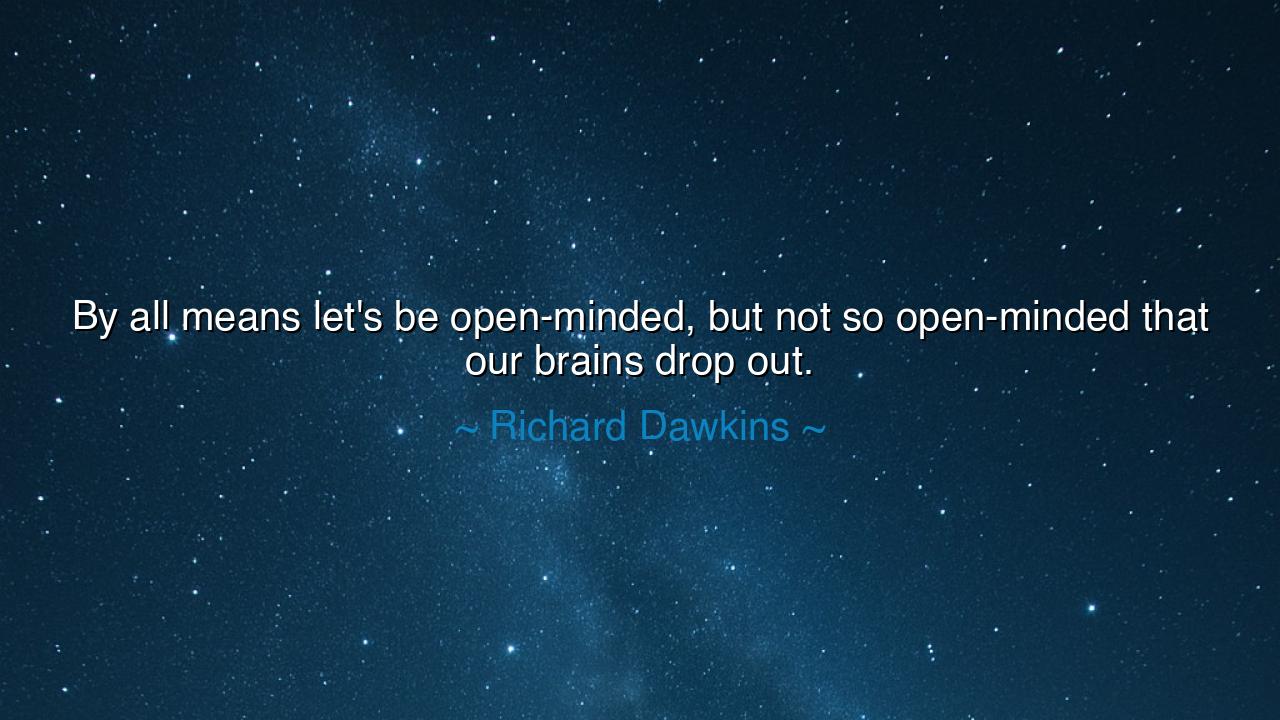
By all means let's be open-minded, but not so open-minded that






Listen, O children of the earth, and hear the words of Richard Dawkins, who speaks with the wisdom of both reason and caution: "By all means let's be open-minded, but not so open-minded that our brains drop out." These words, though spoken with humor and wit, carry a profound lesson about the nature of open-mindedness, reason, and the limits of belief. Dawkins, a man of reason and science, calls us to embrace the open exchange of ideas without falling prey to the dangers of blind acceptance, where we abandon critical thinking and allow ourselves to be swayed by every passing whim or unproven idea.
In the ancient world, the greatest thinkers were those who embraced knowledge and learning, but they also understood the importance of discernment. Socrates, the great philosopher, spent his life questioning and examining the world, never taking anything at face value. Yet, he did not open his mind to every idea without critical examination. He sought truth, not just for the sake of knowledge, but to understand the very essence of life and existence. In this, Dawkins’ words are a call to emulate Socrates—open our minds, yes, but do not let them become so unquestioningly receptive that we lose the power of discernment and reason.
Consider the example of Aristotle, another giant of the ancient world. Though he was open to new ideas, he was also rigorous in his approach to learning. Aristotle’s method involved careful observation, reasoning, and categorization—he would not accept an idea just because it was presented as plausible. His work in biology, for example, was built upon detailed observations of the natural world, and while he was open to learning, he never abandoned logic and evidence. Dawkins’ quote is a reminder that openness to new ideas should always be tempered with critical inquiry—to learn without thinking is to risk embracing falsehoods.
Dawkins also speaks to the danger of blind faith—the kind of faith that does not ask questions, does not seek evidence, and does not engage with the reality of the world. History is full of examples of great ideas and movements that were embraced without reason, leading to disaster. One such example is the Flat Earth theory, which was held by many cultures for centuries despite ample evidence to the contrary. It wasn’t until thinkers like Copernicus and Galileo dared to question the prevailing beliefs and pursue evidence-based thinking that the truth about the nature of the earth was revealed. In this, Dawkins’ warning is clear: open-mindedness without the grounding of reason leads to dangerous misconceptions and false beliefs.
The lesson here, O children of the earth, is one of balance. Open-mindedness is a virtue, a quality that allows us to learn, grow, and expand our understanding of the world. But it must be balanced with the ability to question, to discern, and to think critically. To open your mind is to invite new ideas, but never forget that critical thinking is the shield that protects you from the falsehoods and deceptions that abound. Dawkins’ words remind us that we should embrace new knowledge, but we must always be vigilant in our examination of that knowledge. Do not allow your mind to become so open that it fails to retain the wisdom of discernment and reason.
In your own lives, O seekers of wisdom, embrace the lessons of both openness and reason. Seek knowledge, but let it be tempered with critical thinking. Do not accept things simply because they are popular, fashionable, or widely believed. Just as the ancients asked questions, examined evidence, and sought truth, so too should you. Open your mind, but let it not become so open that it abandons logic, reason, and evidence. Embrace learning, but with the wisdom to discern what is true and what is false.
Remember this, O children: the world is filled with ideas, both wise and foolish. Embrace wisdom, but protect yourself from the dangers of blind acceptance. Use your mind, for it is the greatest tool you have—not only to question and learn, but also to discern and to grow. In this, you will find not just knowledge, but truth, and with it, the clarity to navigate the complexities of life.






AAdministratorAdministrator
Welcome, honored guests. Please leave a comment, we will respond soon